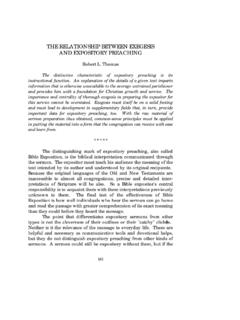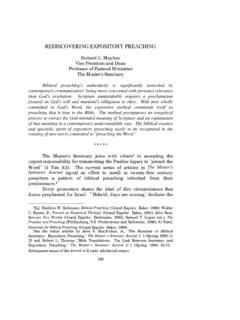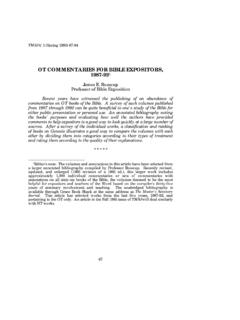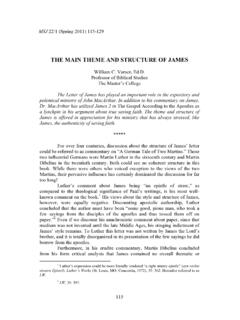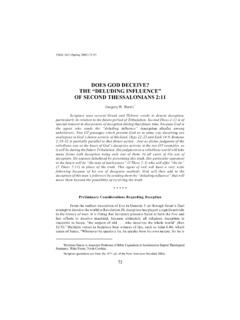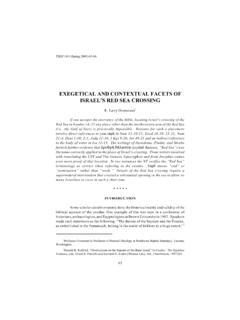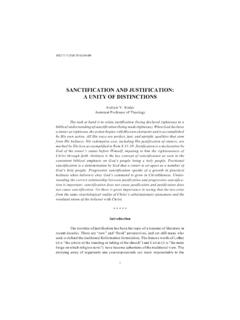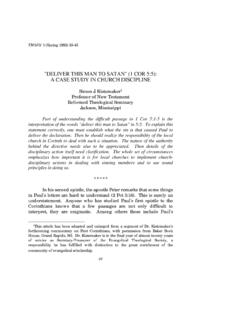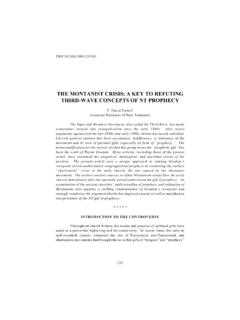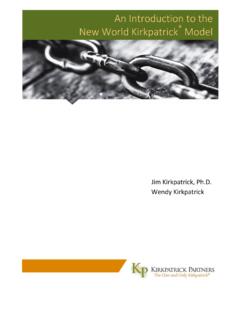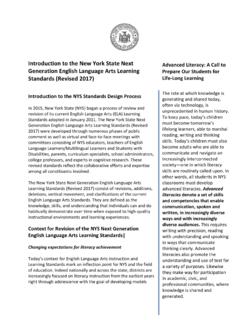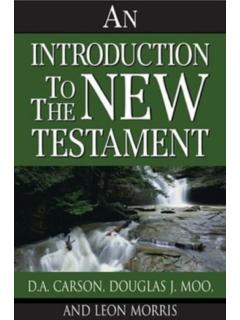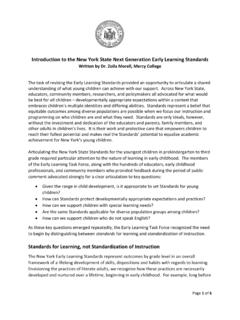Transcription of INTRODUCTION TO NEW COVENANT THEOL OGY
1 149 TMSJ 18/1 (Fall 2007) 149-163 INTRODUCTION TONEW COVENANT THEOLOGYD ennis M. SwansonDirector of the Seminary Library and Director of Israel StudiesNew COVENANT Theology (NCT) is a relatively new system which, though notyet well defined, attempts to combine strengths of Dispensationalism and CovenantTheology and to eliminate the weak points of the two. Its founders have come fromReformed Baptist circles who reacted against key tenets of COVENANT Theology inrejecting such doctrines as the COVENANT of Redemption, the COVENANT of Works, andthe COVENANT of Grace. The movement has a strong emphasis on study of theScripture in attempting to derive a biblically based theology. For the most part,NCT s origins have been local churches rather than academic circles. Though itsgrowth continues to be substantial, it has come about mostly through the channel ofthe Internet rather than works published through major evangelical publising of NCT include John Zens, John G.
2 Reisinger, Fred G. Zaspel, Tom Wells,and Steve Lehrer. Among various programs promoting NCT are ProvidenceTheological Seminary, Sound of Grace Ministries, The John Bunyan Conference, andIn-Depth Studies. The progress of NCT s grow is most obvious in the number ofchurches that have adopted the movement s approach to Scripture, but the impact onmainstream evangelicalism has been minimal because of a lack of exposure throughmainstream publishers, a lack of full endorsement by a noted evangelical scholar, itsdoctrinal differences from well-known historic documents of COVENANT Theology, itsnewness historically, and its failure to produce a published systematic or biblicaltheology. NCT s most notable peculiarities include a rejection of CovenantTheology s superstructure, its granting of priority of the NT over the OT, its rejectionof OT ethical standards for Christians, and its rejection of infant baptism and thedistinction between the visible and invisible church.
3 * * * * *The Hall of Fame Baseball player and noted philosopher, Yogi Berra,150 The Master s Seminary Journal1 Yogi Berra (with Dave Kaplan), When You Come to a Fork in the Road, Take It! (New York:Hyperion Books, 2002). See also Yogi Berra (with Dave Kaplan), What Time Is It? You Mean Now?(New York: Simon and Shuster, 2003).2As of this time there are no articles in any standard theological reference work detailing the most recent edition of the Evangelical Dictionary of Theology (Walter A. Elwell, ed., 2d ed.[Grand Rapids: Baker, 1997, 2003]) has no reference to the Inception is used here somewhat loosely. As this article will discuss, NCT is perhaps betterdescribed as a convergence of the works of several different individuals that has begun the process ofevolving into a coherent and cohesive theological system; however it is fair to say that NCT has yet toarrive at either G.
4 Zaspel, A Brief Explanation of New COVENANT Theology (online at , accessed 3 Feb 2007).5 John G. Reisinger. Abraham s Four Seeds (Frederick, Md.: New COVENANT Media, 1998) said, When you come to a fork in the road, take it. 1 In a nutshell this perhapssummarizes the developing theological system known as New COVENANT Theology(hereafter NCT). While relatively anonymous within the larger sphere of evangeli-calism,2 NCT has nonetheless been experiencing slow but steady growth both innumbers and influence since its inception in the late is described by most of the leaders within the movement as an attemptto find a middle road between traditional COVENANT Theology and DispensationalTheology. As NCT leader Fred Zaspel notes,We are not satisfied with the simple one COVENANT two administrations idea ofCovenant Theology.
5 In our judgment this results in a rather flat reading of Scripturewhich fails to appreciate the advance, the distinctively new character of this Messianicage. Nor are we satisfied with the over-compartmentalizing tendency of NCT leader, John G. Reisinger states most firmly,Dispensationalism drives a wedge between the OT and the NT and never the twain shallmeet as specific promise (OT) and identical fulfillment (NT); and COVENANT Theologyflattens the whole Bible out into one COVENANT where there is no real and vital distinctionbetween either the Old and New Covenants or Israel and the also states,As New COVENANT Theologians, we believe that historic Dispensationalism, as a systemis not biblical (even though it contains truth and is held by many godly men) simplybecause its basic presuppositions are either wrongly assumed or wrongly deduced fromtheir theological system.
6 We are also convinced that COVENANT Theology, as a system, isjust as unscriptural for the same reasons (even though it has truth and many godlyexponents). Until recently most people felt that one had to believe one or the other ofIntroduction to New COVENANT Theology 1516 Ibid, , with all groups or movements, exceptions always occur. Many on the Internet affirm or identifythemselves with NCT but have odd or extreme views. For instance, one proponent of NCT states on hisWeb page concerning Charles H. Spurgeon, Indeed, this COVENANT Theology misuse of law reveals thatSpurgeon knew absolutely nothing about the gospel, flowing oratory notwithstanding. Elsewhere in hissite he labels Spurgeon a false teacher. Gary Anderson, Spurgeon: Prince of Law Preachers (On lineat , accessed 7/20/2007).
7 In his section on Dispensationalism, he also states, Dispensationalism is no less a false gospel than is CovenantTheology (on line at , accessed on 7/20/2007). Thiskind of thought, fortunately, does not represent mainstream two article presents an INTRODUCTION and overview of NCT. It will examinethis movement in the following areas: The Persona and Personalities of NCT, ThePrograms and Progress of NCT, and The Peculiar Positions of NCT. It will alsointeract briefly with some of the positions that NCT has carved out and examinebriefly whether or not this third way has actually been The Persona and Personalities of NCTT hough examining the persona before the personalities responsible for themovement may seem to be a reversal of the investigative process, understanding thepersona and the sphere in which NCT is evolving will make the role of individualpersonalities much more The Persona of NCTTo begin, at its theological core NCT began within the Reformed Baptistmovement.
8 Although NCT rejects the key distinctive of the Reformed Baptistposition, namely the cardinal features of COVENANT Theology, all the foundational orfirst-generation contributors to NCT and many who have since identified with it havetheir roots in Reformed Baptist circles. It is a reactionary movement against the keyaspects of COVENANT Theology, that is, the COVENANT of Redemption, the Covenantof Works, and the COVENANT of Grace. Seemingly, it also is a reaction against a realor perceived dilution of traditional Baptist distinctives that the adoption of CovenantTheology has brought into Reformed Baptist circles, such as the adoption ofCovenant Theology s positions on a visible and invisible church. Reisinger callsthis a theological creation that allows a congregation to deliberately and consciouslyinclude both believers and known unbelievers in its membership.
9 7On a positive note, NCT is not heterodox or cultic at any MainstreamNCT adherents and organizations must be viewed as fellow Christians operatingwithin the larger sphere of evangelicalism. It is characterized by and large as amovement dedicated to an Acts 17:11 approach to studying the Scripture and152 The Master s Seminary Journal9 Which, of course, is not to say that those of the COVENANT Theology and Dispensational theologicalsystems would not affirm the Volker, Foreword to New COVENANT Theology: Questions Answered, by Steve Lehrer (bythe author, 2006) J. Moo, Foreword, in New COVENANT Theology, by Tom Wells and Fred Zaspel(Frederick, Md.: New COVENANT Media, 2002) theology from the By its own claim, it is a movement that seeks toexamine the Scripture and develop a biblically based theology.
10 As Volker states, One must always base his interpretation on the use of Scripture in context and notby imposing his theological system on the text. 10 Douglas Moo, in the foreword toWells and Zaspel s book New COVENANT Theology, acknowledges the same approachby NCT and calls their work a fine representation of this new biblical theologytradition. 11An additional, and important, aspect of the persona of NCT is that itrepresents largely a grassroots movement centered in the local church. What thismeans is that NCT is not a movement that began in seminaries or the academy andworked its way down into the churches. It began in local churches and has slowlymoved its way up in the academic world. The final, and most important, feature of the persona of NCT is that it is a theology of the Internet.
